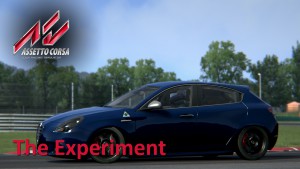Dangerous distractions
During my ongoing literature review I often discover interesting facts about things I’ve never thought about. Sometimes I can connect these facts with my own observations: The result is mostly a completely new idea why things are as they are. Maybe these ideas are new to you, too. Therefore I’ll share my new science based knowledge with you!
This week: This time, I think about the results of my short experiment of explaining a complex task while driving a virtual race car.
A long time ago, I presented a concept of utilizing Assetto Corsa (AC) [1] to demonstrate the danger of using a cellphone while driving [2]. The experiment consists of three stages and allows players to experience the impact of talking while driving. At first, the players must get a feel for the driving experience in AC and learn how to drive the virtual race car. After having practiced driving in AC, the players are required to drive for a certain amount of time on a particular racetrack with the goal to constantly improve their lap times. During this stage, the players are not subjected to any distraction and can fully focus on the task of driving as fast as possible. Finally, after the players have completed the second stage, they are required to drive again for the same amount of time on the exact same racetrack. This time, however, they are required to explain a complex topic and to record their explanations using a microphone while they are operating the virtual race car. In the end, after both stages are completed, the players can compare the lap times between these two sessions and also listen to their explanations in order to experience the impact of talking on their driving performance.
Recently, I managed to give this experiment a try and to record the results of it. Naturally, the results are not statistically relevant as I kept this experiment relatively short by driving only two laps per stage. Additionally, I skipped the learning phase as I was already used to drive a race car in AC and, as a result of this, the experiment was reduced to a two-stage experiment. For the purpose of measuring the influence of talking while driving, I drove the Alfa Romeo Giulietta Q.V. on the Magione racetrack. After having completed the outlap, I drove for two consecutive laps without talking and thus I was able to fully focus on driving the car. Subsequently, I completed two additional consecutive laps with the task of explaining a complex topic [3] while driving.
Despite the limitations of the experiment, the results are a good indication for the negative impact of talking on our driving performance. During the first stage, I achieved lap times of 1:35:617 and 1:35:249, respectively. During the second stage, I achieved lap times of 1:37:393 and 1:40:988, respectively. The main reason for these slower lap times was the fact that I frequently missed the exact braking point and thus had difficulties in driving through the turns of the racetrack. Furthermore, my ability to explain a complex topic was negatively influenced as well. While driving through more demanding parts of the racetrack, I occasionally lost track or I had to stop talking in order to recover the car.
The slower lap times and the difficulties in explaining a complex topic are good indications for the negative impact of talking while driving. Moreover, I was only challenged by the task of explaining a topic. Using a cellphone while driving also requires the driver to follow and to understand the conservation and, as a result of this, using a cellphone could have even a higher impact on the driving performance. Furthermore, I was completely alone on the racetrack and had not to monitor the traffic around me.
As a conclusion, doing other things while operating a vehicle is very dangerous as even a short lack of focus can have devastating results.
